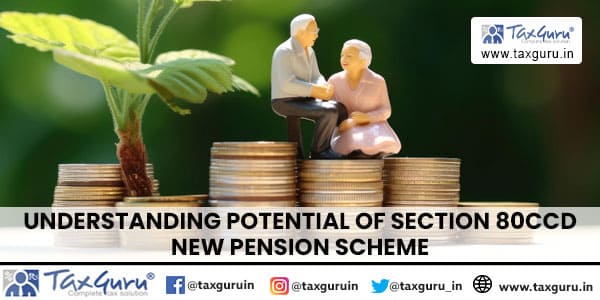Government has understood the Financial Impact of Old Pension Scheme (OPS), which has resulted Financial Unsustainability to Government of India. States’ ability to meet the growing pension liabilities is directly proportional to revenue increment and decreased revenue expenditure. Huge pension costs over long time raises concerns on fiscal sustainability of the economy and given the magnitude of the problem.
Therefore, from January 01, 2004 onwards it was made mandatory for all new recruits to the Government service to follow New Pension Scheme (NPS) notified by Central Government.
To promote the NPS of Central Government, Income Tax has inserted section 80CCD from 01.04.2004 which was amended from time to time.
Let us understand the section and its benefits to Government Employees, Other Employees and Individual in step by step manner:
80CCD(1)
- Deduction of Employees Contribution
- Deposit in to notified scheme
- Full amount of contribution paid or deposited
- Salaried Employees – Not exceeding 10% salary* of Previous Year
- In case other individual – Not exceeding 10% of gross total income of previous year
- Covered under total limit of 1.5 lakh u\s 80C, 80CC, 80CCD etc

80CCD(1B)
- Deduction of Employees Contribution
- Deposit in to notified scheme
- Deduction can not exceed 50000
- This deduction is in addition to 80CCD(1)
80CCD(2)
- Deduction is for Employer’s Contribution
- Not exceeding 14% of salary* in case of Government Employees
- Not exceeding 10% of salary* in case of other employees
* Salary includes Dearness Allowance, if terms of employment so provide, but excludes all other allowances and perquisites
Let us understand the above provision by way of practical example :
Mr.Abhay is an Government Employee, receives total salary of INR 18.00 Lakh, Out of which Salary and DA is INR 14.00 Lakh. Abhay is contributing INR 14000 for NPS and Employer is also contributing INR 14000 to NPS, what would be total allowable deduction to Mr.Abhay while computing taxable income.
Answer:
Total Contribution by Mr.Abhay (14000*12) = 168000
Total Contribution by Government (14000*12) = 168000
1. Under 80CCD(1B) Mr. Abhay can claim deduction of his own contribution not exceeding INR 50000, Therefore he will claim INR 50000 as deduction under this section.
Deduction u\s 80CCD(1B) = 50000
2. Under section 80CCD(1), Mr. Abhay can claim deduction of INR 118000 out of total contribution of 1.68 Lakh after reducing INR 50000 already claimed.
Deduction u\s 80CCD(1) = 118000
3. Deduction u\s 80CCD(2) would be whole amount contributed subject to maximum of 14% of salary which comes out to be 196000. As the actual contribution is lower than 14% of salary, Mr.Abhay would get deduction is total contribution of INR 168000
Deduction u\s 80CCD(2) = 168000
Therefore Total deduction u\s 80CCD would be INR 336000/- which would save tax of INR 104832 (31.2%) which is huge tax saving.
Let us continue with the same example were Mr.Abhay is employed in private company, what would be total deduction and tax saving.
Answer :
1. 80CCD(1B) = 50000
2. 80CCD(1) = 118000
3. 80CCD(2) would be 168000 or 10% of Salary which is 140000, therefore allowable deduction would be INR 140000
Total deduction u/s 80CCD would be INR 308000, which would save tax of INR 96096 (31.2%) which is again a huge tax saving.
It is observed that employees do claim the deduction for their own contribution, but forget to claim benefit of 80CCD(2) in form 16 given by employer, therefore one must make calculation of the same and claim at the time of filing ITR.
Further, There comes one more questions on everyone’s mind what happens on closure or opting out of this scheme,
it is clarified under sub-section 3 of 80CCD that; any amount received at the time of closure or option out of the scheme would be taxable in the previous year when it is received in the hands of assessee or nominee except when nominee receives any amount after the death of assessee.
It is further clarified that; if amount received is used for purchase of annuity would not be taxable or it won’t be considered as amount received.
Conclusion :
Section 80CCD is highly beneficial section if used properly for claiming deduction and results in to huge tax savings, the only need is to understand it clearly and do the correct working. For any query kindly put in to the comment will try to answer in practical and beneficial way.




